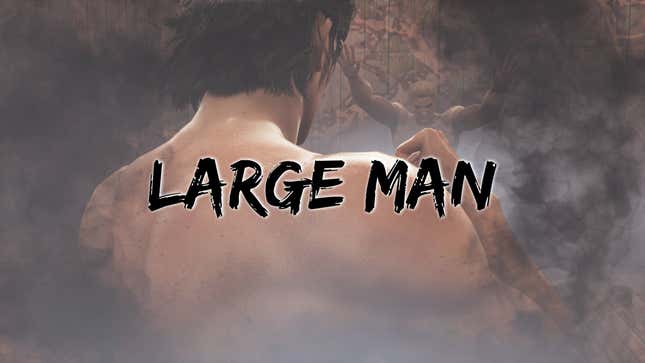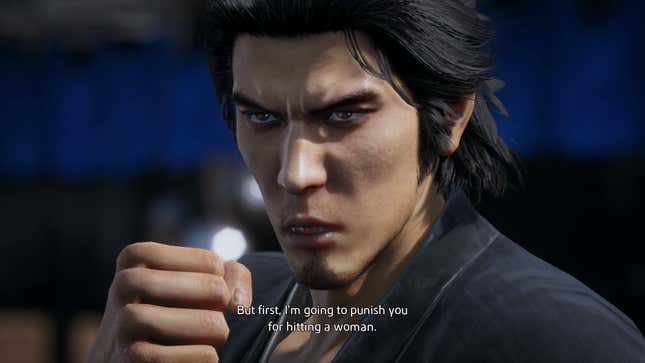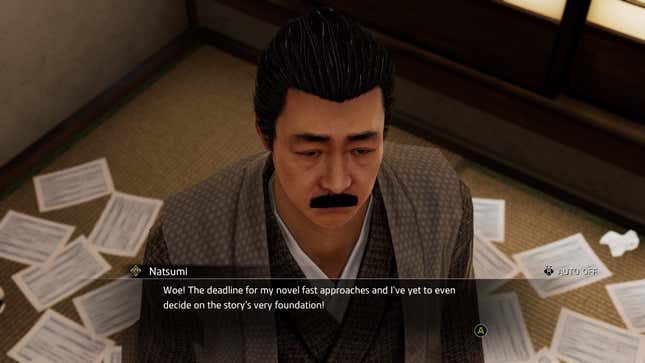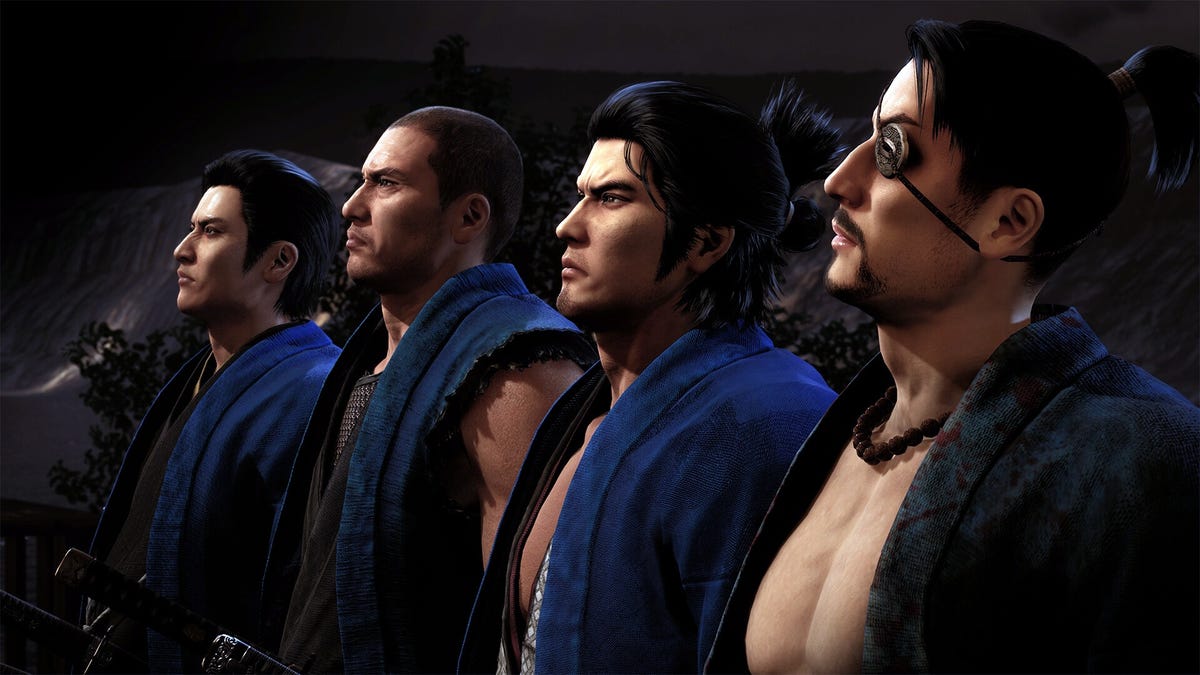The Like a Dragon series (formerly known as the Yakuza series) is the most video game ever. This melodramatic crime drama series about a bunch of burly gangsters with the power to rip their suits clean off from their lapels has wacky plotlines where you hire a chicken as a real estate employee, manage a cabaret maid cafe, and battle a bunch of criminals with a diaper fetish. The series is a hoot.
Read More: Like A Dragon: Ishin!: The Kotaku Review
Most of the hilarity emanating from Like a Dragon and its spin-off series, Judgment, comes from the franchise’s snappy dialogue and the absurdist character and item descriptions of its English translations. For example, Like a Dragon’s stalwart protagonist, Kiryu Kazuma, can go from calling a new fighting technique he saw on the street “rad” to vehemently explaining that his propensity to brawl with thugs in public doesn’t make him a “fisting artist.”
Don’t let the fact that developer Ryu Ga Gotoku’s samurai spin-off, Like a Dragon: Ishin!, is a historical period piece that takes place in 1867, make you think that it won’t contain the same levels of ludicrous sidequests and wacky dialogue as its predecessors. If anything, the fact that Kiryu’s feudal stand-in, Sakomoto Ryoma, partakes in similar madcap misadventures in the year of the Meiji restoration and the downfall of the Shogunate only adds to the game’s zaniness.
Read More: I Met The Most Annoying Yakuza NPC In Like A Dragon: Ishin!
In that spirit, I spoke with Marilyn Lee, the senior localization producer for Like a Dragon: Ishin!, to get some insight into the work that was put into crafting Like a Dragon: Ishin’s English translation.
Localization in a nutshell
Much like how Like a Dragon’s bombastic heat system fighting moves ought to make you feel like an extreme beast of a man, a localizer must ensure that every bit of text in Like a Dragon emanates an authentic Yakuza experience.
Read More: The Yakuza Devs Are Stunting On The Entire Gaming Industry
“The translating team takes the raw Japanese and churns out a direct translation as true to the meaning of the Japanese as possible but ultimately clunky, dry, and not especially what we’d call natural,” Lee said. “The team of editors then takes that line and brings in the characterization, makes it sound like natural dialog, which becomes the final script.”
‘Translation is not mathematics’
One way of providing context for players that’s often used in translated works of Japanese games is to swing south with dialogue translations of characters with Kansai accents and give them a southern Texan drawl. But while folks who consume Japanese media have become accustomed to Osakan characters having the vernacular of a person hailing from Alabama or the Bronx, Lee said the LaD localization team strives to “avoid making a direct analog between specific English and Japanese dialects.”
Lee credits the LaD localization team’s decision to examine vernacular characteristics and accents “on a deeper level” to Scott Strichart, a senior localization producer at Sega and “the former architect of Like a Dragon’s Western renaissance.” “While our philosophy on Kansai-ben involves many colloquialisms that might independently register as Southern, we’ve failed if players are categorically hearing all Kansai speakers with a twang,” Lee said.
“In the case of Ishin!, we would invite players to compare characters like Majima and Saejima (or Soji and Nagakura) to the game’s Gunman trainer, William Bradley, who was deliberately written to evoke the manner of a late 19th-century Southern cowboy. Likewise, this game also introduces the archaic Tosa-ben dialect, which we hope is difficult to attach to a given style of English and more so simply reads as rustic and insular,” Lee said.
Read More: The Samurai Yakuza Game Will Guest-Star A World-Famous Wrestler And An Internet Hottie
When it comes to how much free reign the LaD localization team has in terms of cursing, Lee says games with the localization caliber of the Like a Dragon series “can’t simply mechanically swap out ‘kuso’ for ‘damn’ because “translation is not mathematics.”
“Cursing is a vital linguistic component in English, and therefore our editors generally have leave to employ it as freely as they would in any other M-rated title (within reason),” Lee said.
“Localization, as we view it, favors recreating the experience of the source language user rather than risking a sacrifice in writing quality to stay devoutly faithful to the source language itself. If a skillfully deployed curse is going to make a joke hit as well in an English line as it did in a curse-free Japanese line, then we’ll almost always use that curse.”
Localization funsies
My most hot-button question for Lee was which character in Ishin! was her favorite to localize. It should be noted that when I sent Lee this inquiry via email, I made sure to include the tagline “and why is it Majima?” To my delight, Lee replied saying Majima is “fun to watch, he’s fun to fight, and he’s absolutely fun to localize.”
“Majima is the cross-section of so many compelling character types: he can be hilarious, he can be frightening, he can oscillate between being oblivious and being the smartest man in the room and somehow it always feels authentic. Yakuza 0 players also know that deep down, there’s a real human there, projecting all these personality traits for reasons he may not even remember (in the main series’ continuity, anyway).”
Read More: Yakuza Producer Surprised Y’all Find Majima So Sexy
Majima’s cult of personality notwithstanding, Lee said Ishin’s minor characters deserve their due just as much as the Mad Dog of Shimano (period piece edition).
“Working for days at a time on minor characters such as Tom the would-be samurai, or the cryptic, slang-weaving Mysterious Merchant gives our team the chance to craft a wide variety of voices. Truthfully, it demonstrates how tenacious the settings of RGG games are, that they support so many [people] of so many dispositions and still feel cohesive.”
Lost in translation

Recently, Viz Media translator Kumar Sivasubramanian famously threw in the towel after having the unenviable task of translating Cipher Academy, a mystery series by the creator of the Monogatari series. Sivasubramanian called it quits with Cipher Academy because a bulk of the series’ dialogue was filled with cultural or phonetic puns that don’t make sense in English. Like Sivasubramanian, LaD’s localization team is also confronted with the herculean task of translating Japanese puns or jargon for English-speaking players.
Read More: Translator Steps Down From Shonen Jump Manga After Declaring It Untranslatable [Update]
Whenever there are nuances and phrases that don’t have a true 1:1 equivalent in either English or Japanese, Lee said the LaD localization team uses their “best judgment” to find “suitable methods to convey things as closely as possible to the essence of the source language.”
Although some LaD fans can be “diehard purists,” Lee says most have a generally subjective line on what sounds “‘true” to the source material.

With Like a Dragon, we believe that players can tell that the writing is meant to harmonize with every other aspect of the presentation. If a moment has an over-the-top zoom-in and we replace a simple ‘Nani!?’ with an English line that matches the absurdity of the cinematography, we haven’t betrayed the authorial intent there—we’ve done our best to execute on that intent across countless linguistic and cultural chasms.”
Much like colloquialisms in Cipher Academy, Lee said Japanese puns “never translate.” Whenever a pun is uttered in the LaD series, Lee said her team must “roll with them as they come and commiserate together for the real tricky ones.”
“Thankfully, that also means there are afternoons spent with the whole team shouting out funny chicken names, which is basically the entire reason we all got our college degrees,” Lee said.
Measure twice, cut once (Yakuza style)

In total, Lee said it took the localization team a little over a year to finish localizing Ishin! to have the game ready to launch on February 21 for PS5, PS4, Xbox Series X/S, Xbox One, and PC. Meanwhile, the games that took the longest to finish localizing are Yakuza 3, 4, and 5 because they were a part of the Yakuza Remastered Collection, Lee said.
“Some projects took a long time from start to finish just due to the localization process was intertwined with the development of the game. Some took long because of the number of languages involved. Others took a long time because of the sheer volume of the project,” Lee said.
While localizing the drama and humor in Ishin! was par for the course with other games in the series, the trickiest part of localizing the spin-off was ensuring players weren’t lost with the historical context and geography in Ishin!
“Our updated glossary and new memoir feature can do some of that work, but ultimately it falls to astute translation and sharp editing to be successful. Creating context for the audience is critical,” Lee said.
Historical context for the Meiji Restoration period
For historical reasons, Ishin! has an unapologetically negative stance toward Americans and European pressure at the end of the Edo Period, which staff writer Sisi Jiang expanded upon in their review for Ishin! When it came to handling the localization of a game that criticizes the countries some players come from, Lee reiterated that it’s a localizer’s job to ensure the experiences designed in a game are brought to players from different countries, even if aspects of translated text offend people.
“Our job as localization professionals is to convey the meaning and sentiment of a piece of media as accurately as possible in another language. Sometimes this means tackling a challenging subject, especially in Ishin’s case where many characters are driven by different political ideologies that are linked to a historical time period,” Lee said. “We did our best to convey the text, and players have the freedom to come to their own conclusions.”

